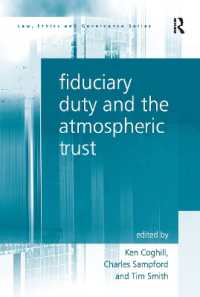- ホーム
- > 洋書
- > 英文書
- > Religion / Ethics
Full Description
The Seven Deadly Sins have become the seven markers of success in America. Lust, pride, greed, sloth, envy, gluttony, wrath—these once-condemned principles now guide people's pursuit of the good life.
Stacey M. Floyd-Thomas examines how the Seven Deadly Sins have shaped the moral strivings and sociopolitical condition of American society and culture in the twenty-first century. Drawing on a multidimensional approach, Floyd-Thomas uses race, gender, class, and other lenses to break down the moral crises that define the American Dream. Her critique exposes the harm done by individual and collective practices of sexual objectification, capitalist materialism, wealth inequality, and technological hubris before pivoting to the rise of right-wing populism, white Christian nationalism, and the politics of cruelty. But Floyd-Thomas also proposes an ethic that emphasizes truth-telling, community engagement, and values rooted in humility, justice, and mercy—a new path for the US to overcome systemic oppression and create a more just society.
Evocative and ambitious, When the Good Life Goes Bad takes readers on a wide-ranging journey through US life and culture to explain what corrupted the American dream.
Contents
Foreword by Michael Eric Dyson
Preface
Introduction: "Oh Say Can You See?" The Good Life in Contemporary America
1. Experience of the Good Life: Lust as Pleasure without Conscience
2. Institution of the Good Life: Greed as Commerce without Morality
3. Myth of the Good Life: Sloth as Wealth without Work
4. Doctrine of the Good Life: Pride as Knowledge without Character
5. Material of the Good Life: Envy as Science without Humanity
6. Ritual of the Good Life: Gluttony as Worship without Sacrifice
7. Legality of the Good Life: Wrath as Politics without Principles
Conclusion: Making Americans Better, If Not Good; Reconciling Ourselves to Virtue








